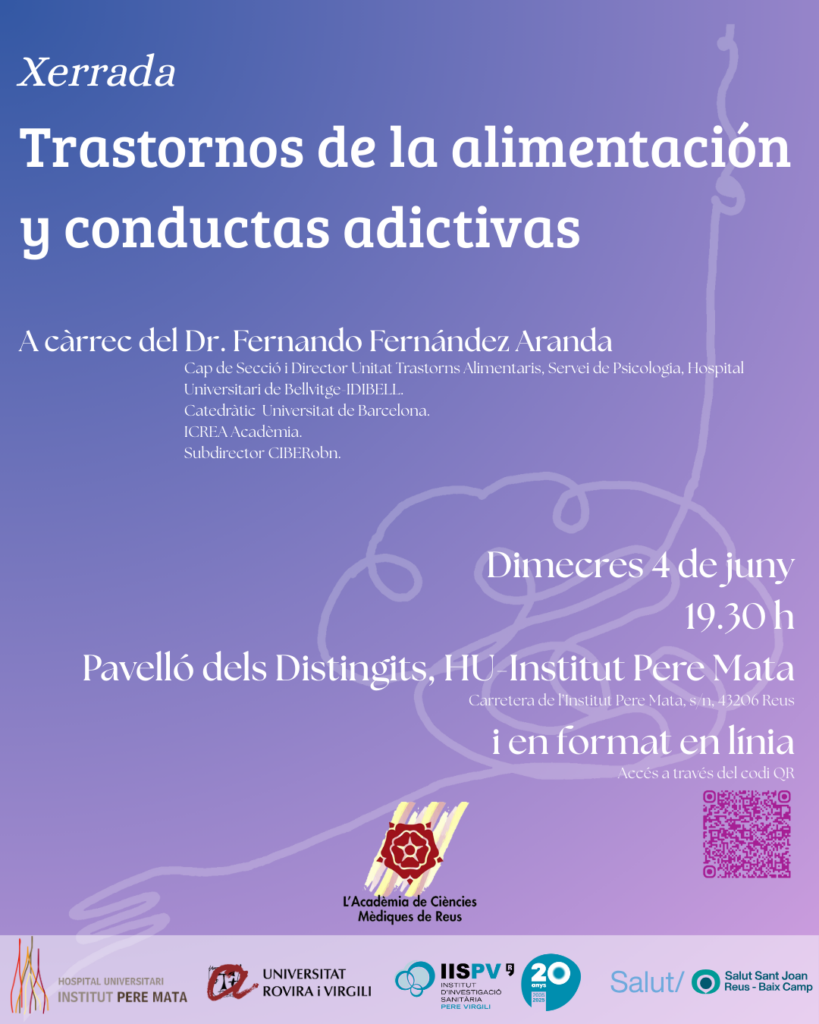The agreement foresees the cooperation of the two institutions in the celebration of acts and events that promote healthy habits among citizens.
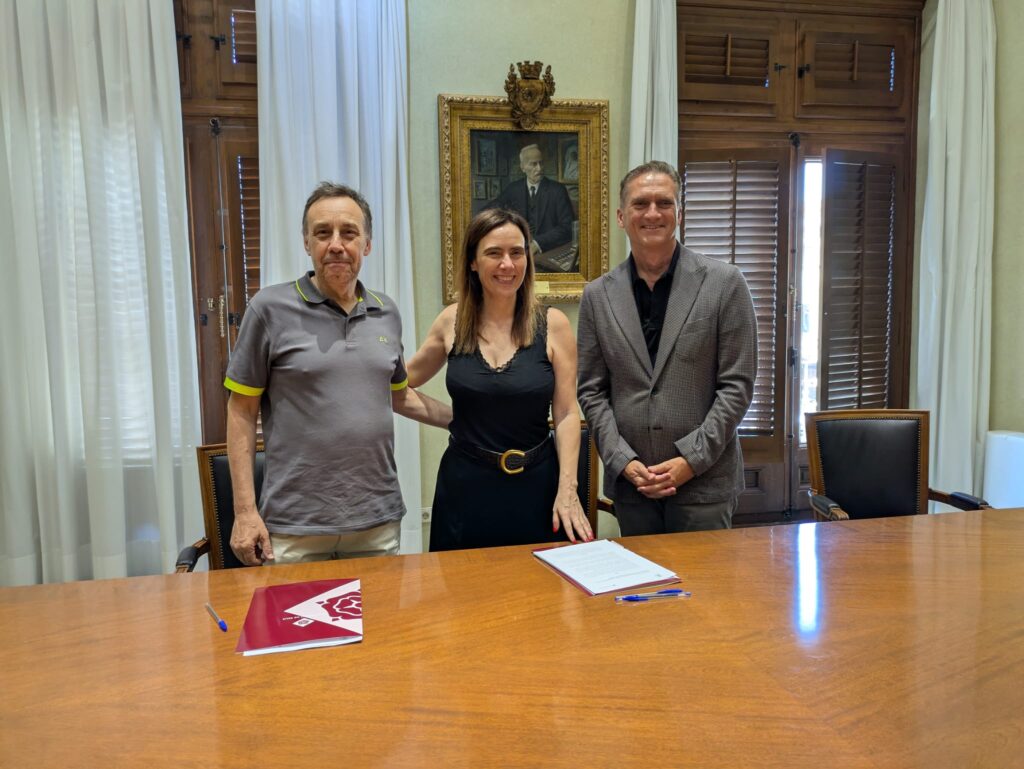
The Mayor of Reus, Sandra Guaita, and the Director of the Institut d’Investigació Sanitària Pere Virgili (IISPV), Joan Vendrell, have signed a framework protocol to foster collaboration in the fields of healthcare, public health, and health promotion. The agreement emphasises early disease detection and the capacity for a swift and effective response to health emergencies. This is the first formal agreement between the two institutions and includes provisions for joint initiatives and projects to be developed across various departments of the Reus City Council and the IISPV. It also outlines cooperation in organising events aimed at promoting healthy lifestyles among citizens.
In terms of knowledge transfer, the protocol supports the dissemination of scientific output generated by IISPV researchers, including clinical trials, patents, partnership agreements, and the creation of start-ups. It also promotes the organisation of specialised workshops and seminars focused on talent development and employment in the health sector, with the aim of equipping professionals with skills and knowledge aligned with the evolving demands of the labour market. Another key aspect of the agreement is the promotion of research addressing specific societal and industrial challenges, as well as the establishment of strategic alliances to lead transformative sectoral and regional projects, particularly through citizen science initiatives.
The framework protocol establishes a four-year collaboration period, with the possibility of annual extensions for up to an additional four years. It also allows for amendments or termination. A monitoring committee has been created to oversee the implementation of the agreement, ensure compliance, and facilitate the development of specific actions.
The signing of this protocol reaffirms the Reus City Council’s commitment to innovation, science, and technology—a commitment that was recognised last May when Reus was awarded the title of City of Science by the Ministry of Science, Innovation and Universities. In this regard, Mayor Guaita stated: “Science, research, and innovation must be at the heart of public policy as drivers of regional development. This is a key priority in our 2023–2027 Municipal Action Plan. Public administration must foster knowledge generation and management, professional training, and talent attraction, strategically rooted in the local context. This commitment can only be realised through active collaboration with the business community, scientific and academic institutions, and public authorities.
The signing of this protocol also coincides with the 20th anniversary of the IISPV, celebrated throughout 2025. According to the institute’s director, “It is vital to know that local institutions support us. Building strong ties with the region enables us to translate scientific knowledge into real solutions for patients and society. This is the core mission of our institute and the researchers who work through the IISPV”.
Levels of butyrate and isobutyrate, short-chain fatty acids produced by the intestinal microbiota, are associated with an increased risk of developing the disease, according to a study led by the IISPV and Hospital de Mar
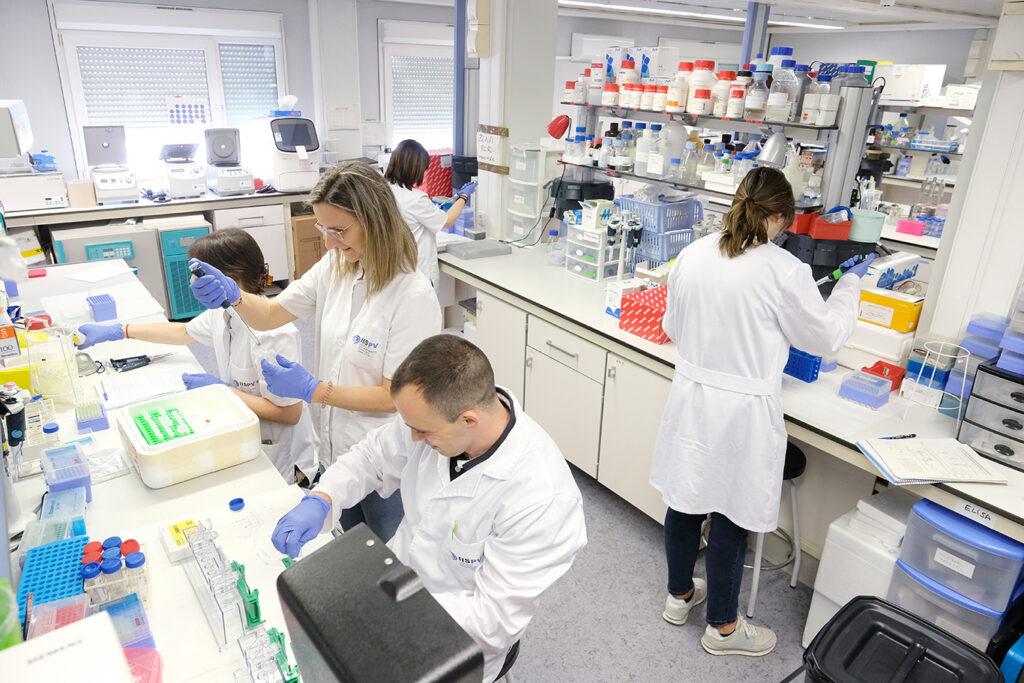
A research team led by scientists from the Institut d’Investigació Sanitària Pere Virgili (IISPV), the Hospital de Mar Research Institute and the Diabetes and Associated Metabolic Diseases area of the CIBER (CIBERDEM), has identified two compounds present in the blood – butyrate and isobutyrate – that could act as early biomarkers of the development of type 2 diabetes in apparently healthy people. The work, published in the scientific journal BMC Medicine, is based on longitudinal analysis of more than 2,400 participants in the statewide project Di@bet.es over seven years.
These compounds are short-chain fatty acids (SCFA) produced by the fermentation of dietary fiber in the gut. “This study provides new evidence on the association between SCFA and the risk of developing type 2 diabetes,” explains Dr. Joan Vendrell, clinical coordinator of the CIBERDEM research group at IISPV and professor at the URV. “Notably, elevated levels of butyrate and isobutyrate early in the study were associated with an increased likelihood of developing type 2 diabetes, even after adjusting for traditional risk factors such as obesity, arterial hypertension or family history,” adds Dr. Gemma Llauradó, also an investigator of the study, attached to the Endocrinology and Nutrition Service of the Hospital de Mar, a researcher at her research institute.
The impact of diet on gut microbiota
The study also included an analysis of participants’ dietary patterns using a food frequency questionnaire. “Following a Mediterranean diet or consuming high-fiber foods were found to be associated with higher levels of SCFA. Even so, these habits alone did not demonstrate sufficient predictive value on the development of diabetes,” explains researcher Sonia Fernández-Veledo, head of the CIBERDEM research group at the IISPV.
The researchers stress that a diet rich in fiber continues to be fundamental for preserving the balance of the intestinal microbiota, a key factor in metabolic regulation and inflammatory response. In this sense, the work points out that SCFA could function as signaling molecules with a determining role in these physiological processes.
Towards more personalized prevention
This discovery opens the door to new, more effective and personalized prevention strategies based on the analysis of the individual metabolic and microbiotic profile. The authors of the study call for further research to better understand the interaction between these metabolites and the body, and how they can be integrated into clinical protocols for early detection of type 2 diabetes risk.
Reference article
Llauradó G, Cedó L, Climent E, Badia J, Rojo-Martínez G, Flores-Le Roux J, Yanes O, Vinaixa M, Granado-Casas M, Mauricio D, Fernández-Veledo S, Vendrell J. Circulating short-chain fatty acids and Mediterranean food patterns. A potential role for the prediction of type 2 diabetes risk: The Di@bet.es Study. BMC Med. 2025 Jun 6;23(1):337. doi: 10.1186/s12916-025-04186-9.
A diet rich in omega-3 foods during pregnancy has beneficial effects on the brain development of children and adolescents
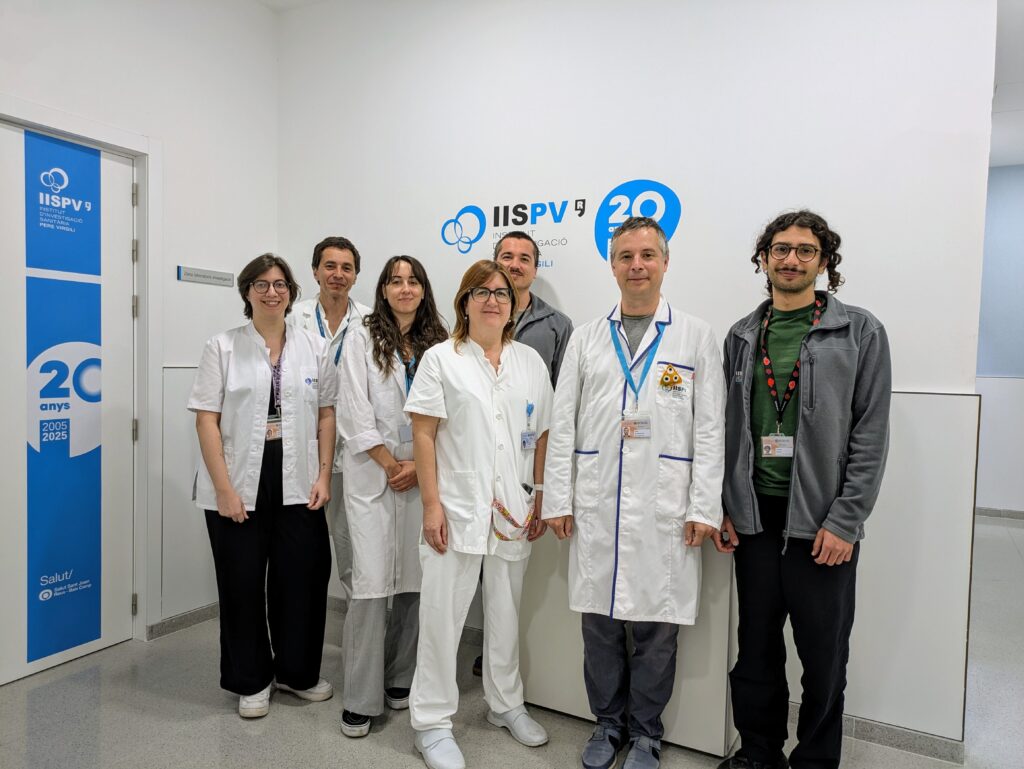
The consumption of nuts during pregnancy, especially walnuts, benefits the neuropsychological development of children and adolescents, according to a study by the Institut d’Investigació Sanitària Pere Virgili (IISPV), titled Maternal prenatal nut and seafood consumption and child neuropsychological function from 4 to 15 years of age: a population-based cohort study, and published in The American Journal of Clinical Nutrition. The study, led by the Clinical and Epidemiological Neuroscience Research Group (NeuroÈpia) of the IISPV, includes contributions from Barcelona Institute for Global Health (ISGlobal), a centre supported by the “la Caixa” Foundation, and the California Walnut Commission, and is also included in the INMA project. This observational study focuses on the influence of maternal diet during gestation, a critical period for early brain development, and also highlights adolescence as another key stage when several brain regions continue to mature.
A sample of 1,737 mother-child pairs from four Spanish regions was studied: Asturias, Guipúzcoa (Basque Country), Sabadell (Catalonia) and Valencia. Maternal diet was analyzed using a food frequency questionnaire, while the children’s neuropsychological function was assessed through standardized tests measuring reaction time and variability (attention), working memory, and fluid intelligence.
The research took into account the consumption of fish—especially fatty fish—which, like walnuts, contains high levels of omega-3 fatty acids. These healthy fats have been shown to have a positive impact on the brain development of children and adolescents, according to the study’s findings. However, the researchers leading the project caution that fatty fish consumption should be approached carefully, and the recommended portions established by the WHO, via the European Food Safety Authority (EFSA) and the Spanish Agency for Food Safety and Nutrition (AESAN), should not be exceeded. Ariadna Pinar Martí, the study’s lead researcher, notes that high consumption of walnuts and fatty fish is associated with improvements in attention, working memory, and fluid intelligence. She adds that the omega-3 fatty acids present in these foods partially contribute to this relationship with neuropsychological development, particularly regarding attention.
Impact on risky decisions
The NeuroÈpia Research Group continues to investigate how maternal consumption of nuts and fish influences the brain development of offspring. They have also focused on the acquisition of more complex skills, such as risky decision-making in eleven-year-old children. In this regard, the article Maternal nut and fish consumption during pregnancy and child risky decision-making at 11 years old explores whether a maternal diet that includes these foods is associated with certain cognitive functions and behaviors, such as impulsivity. This study, led by researcher Marina Ruiz Rivera, has been published in the European Journal of Child and Adolescent Psychiatry. It emphasizes that the consumption of nuts and fish during pregnancy may have an effect on complex brain functions, such as decision-making.
The final sample consisted of 1,386 preteenagers and their mothers, with 1,081 participants specifically assessed for decision-making. According to Ruiz Rivera, higher maternal consumption of nuts during the first trimester of pregnancy was associated with a lower score in risky decisions in eleven-year-old children. Moderate fish consumption was associated with a higher impulsivity index in children of this age. Therefore, this study “adds to the evidence on the importance of nutrition during pregnancy for complex neuropsychological functions”. The study also emphasizes that “the available data are limited to eleven years of age, a stage in which the prefrontal cortex is not fully developed”, and therefore “a definitive causal relationship cannot be established”.
Looking ahead to future research in the field of nutrition, the NeuroÈpia Research Group highlights the importance of incorporating neuroimaging techniques. Applied specifically to the cohort studied in the two projects, “it will open up new scenarios for novel measurements, represent an innovation in this field, and allow us to examine whether diet during pregnancy influences not only cognitive functions but also brain structure”, emphasizes Jordi Julvez, head of the research group behind the two studies.
Bibliographic reference of the first study:
Pinar-Martí A, Ayala-Aldana N, Ruiz-Rivera M, Lertxundi N, Subiza M, González-Safont L, Vioque J, Riaño-Galán I, Rodríguez-Dehli C, Iglesias-Vázquez L, Arija V, Fernández-Barrés S, Romaguera D, Pascual-Rubio V, Fabregat-Sanjuan A, Healy D, Basagaña X, Vrijheid M, Guxens M, Foraster M, Julvez J. Maternal prenatal nut and seafood consumption and child neuropsychological function from 4 to 15 years of age: a population-based cohort study. Am J Clin Nutr. 2025 May 5:S0002-9165(25)00249-7. doi: 10.1016/j.ajcnut.2025.04.032. Epub ahead of print. PMID: 40334748.
Bibliographic reference of the second study:
Ruiz-Rivera M, Pinar-Martí A, Babarro I, Ibarluzea J, Vioque J, Llop S, Fernández-Somoano A, Tardón A, Pascual-Vicente R, Fabregat-Sanjuan A, Fernández-Barrés S, Romaguera D, Guxens M, Julvez J. Maternal nut and fish consumption during pregnancy and child risky decision-making at 11 years old. Eur Child Adolesc Psychiatry. 2025 Jun 10. doi: 10.1007/s00787-025-02750-5. Epub ahead of print. PMID: 40493090.
A URV-IISPV-CIBEROBN study warns that 80% of children’s products are not nutritionally adequate and should not be promoted
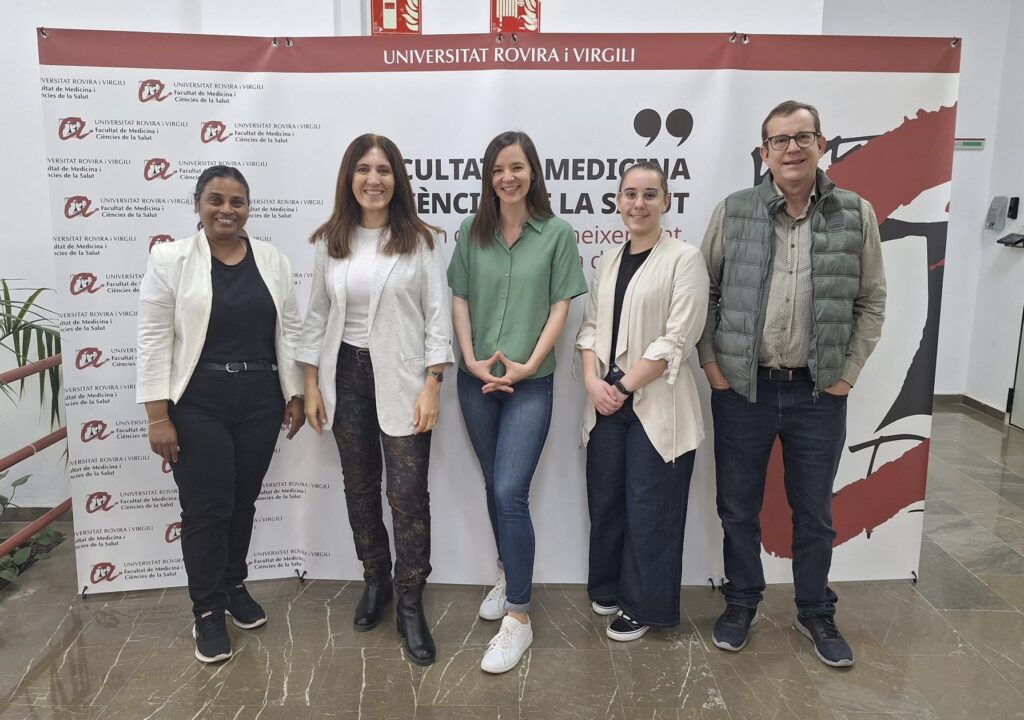
Most foods for children under three years of age marketed in Spain are of low nutritional quality and do not meet the standards set by the World Health Organization (WHO). This is indicated by a study led by the Rovira i Virgili University (URV) together with the Pere Virgili Health Research Institute (IISPV) and the CIBER of Obesity and Nutrition (CIBEROBN), which warns that these products should not be promoted for sale.
To carry out the study, which has been published in the European Journal of Pediatrics, more than 800 products were analyzed, including purees, dairy products, snacks and beverages. The research team detected repetitive nutritional problems in these foods, such as a high content of added sugars -often in the form of concentrated juices-, low caloric intake and low energy density. In addition, many of the product labels analyzed were the result of marketing strategies that were misleading because they showed confusing product names, such as “veal with carrots”, in cases where veal was a minority ingredient. They also found food packaging with messages such as “no added sugars” and even with unscientific health claims.
“Many of these products generate a false perception of quality, when in fact they are not suitable according to WHO for the healthy development of children,” warns Paulina Maria Leszczynska, first author of the study.
“No podemos permitir que los intereses comerciales prevalezcan sobre la salud infantil. Es imprescindible contar con una normativa clara, vinculante y basada en evidencias científicas que proteja a la población más pequeña”, advierte Nancy Babio, investigadora del Departamento de Bioquímica y Biotecnología de la URV e investigadora principal del proyecto.
Stopped regulation
Currently, food advertising in Spain is governed by the PAOS Code, a voluntary self-regulation system with no sanctioning mechanisms. In 2022 the Ministry of Consumer Affairs proposed a Royal Decree to regulate the advertising of food and beverages aimed at children, using the WHO criteria as a basis, but the processing of the text is still blocked pending approval by the Council of Ministers.
In view of these facts, the research team has called on the Government to approve without further delay the Royal Decree regulating the advertising of baby food and to prohibit the promotion of products that are not suitable for children under 3 years of age, especially those with excessive sugar or misleading claims.
The work has been carried out by the dietitian-nutritionist Paulina Maria Leszczyńska and the research team of the Department of Biochemistry and Biotechnology of the URV Sara de Heras-Delgado, Sangeetha Shyam, Jordi Salas-Salvadó and Nancy Babio, which is also part of the IISPV and CIBEROBN. The study has counted with Diane Threapleton and Janet Cade, from the University of Leeds, authors of the Nutrient and Promotion Profile Model Calculator tool, used to evaluate the nutritional and promotional performance of children’s products according to the WHO model.
Bibliographic Reference: Leszczyńska PM, de Las Heras-Delgado S, Shyam S, Threapleton D, Cade J, Salas-Salvadó J, Babio N. Nutricional contento y promocionar prácticas de foods para niños y jóvenes en el español mercado: en el cross-sectional product evaluation. Eur J Pediatr. 2025 May 10;184(6):333. doi: 10.1007/s00431-025-06156-y. PMID: 40347273; PMCID: PMC12065749.
The group has received a grant from the Catalan Society of Rheumatology and the objective is to work towards early detection and even more personalized treatments
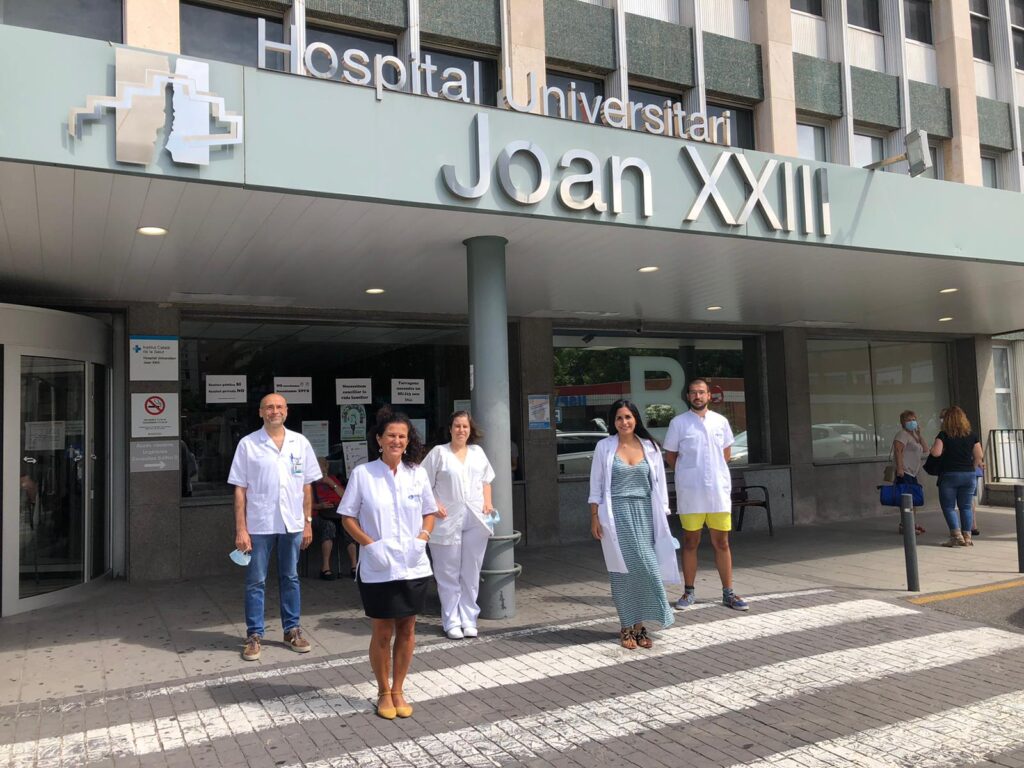
Researchers from the Biomarkers of Disease and Molecular Mechanisms (DIBIOMEC) research group of the IISPV and the Hospital Universitari Joan XXIII de Tarragona are working to improve the diagnosis of rheumatoid arthritis. The task has received a grant from the Societat Catalana de Reumatologia and the aim is to work towards early detection and even more personalized treatments. The grant will allow the development of a clinical study focused on rheumatoid arthritis, a project led by Dr. Samantha Rodríguez and promoted by Dr. Matilde Rodríguez Chacón, PI of the research group.
The study will validate a panel of biomarkers previously identified by DIBIOMEC that could change the way autoimmune disease is diagnosed and treated. In fact, these have shown, in the eyes of the research team, great potential in detecting the disease in early stages and predicting the response to treatments.
By analyzing serum samples from patients at different stages of rheumatoid arthritis, the study aims to confirm the clinical utility of the biomarkers they are working with.
The DIBIOMEC group, with extensive experience in the study of biomarkers in inflammatory and oncological diseases, has international patents in the field of molecular diagnostics. With this new line of work, the group transfers its knowledge in the field of rheumatology, to shorten the time of diagnosis and improve the therapeutic approach to the disease from its earliest stages.
This Wednesday, June 11, World Prostate Cancer Day, the importance of ensuring early detection is highlighted. The IISPV conducts research to find more effective and less invasive ways to predict advanced stage tumors and treat them earlier
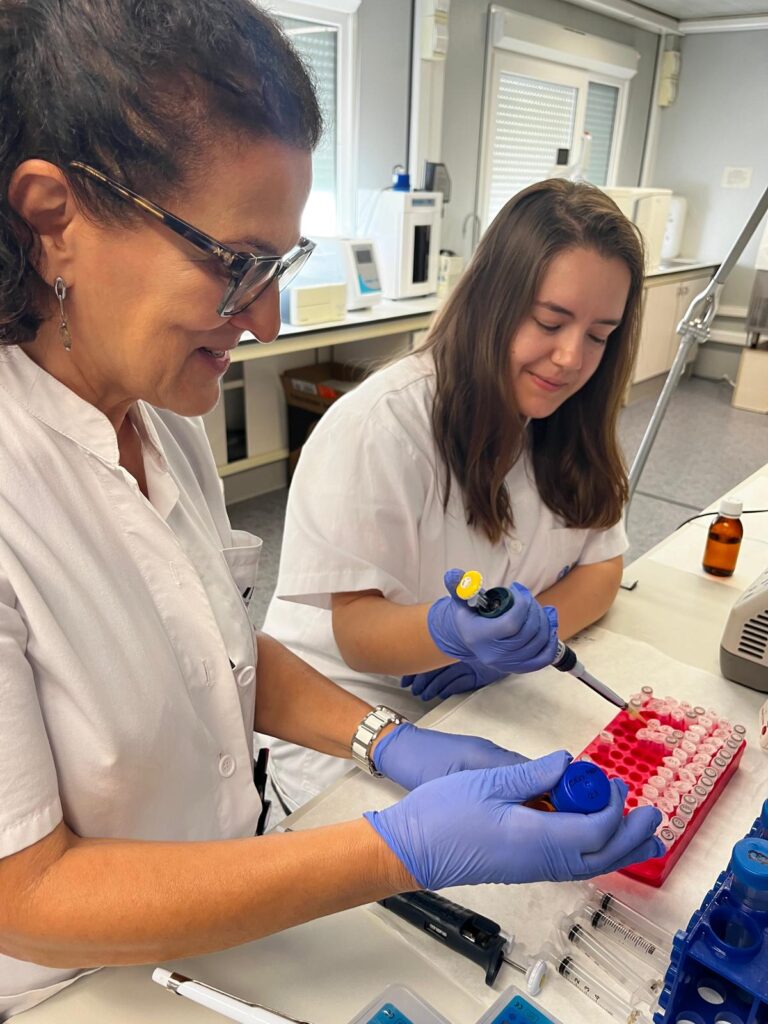
Prostate cancer is the most common tumor among men in the province of Tarragona. Each year approximately 670 new cases are diagnosed there, a figure that represents almost one in four male cancers. On the commemoration of World Prostate Cancer Day, this Wednesday, June 11, the Institut d’Investigació Sanitària Pere Virgili (IISPV) recalls the importance of ensuring early detection of this type of cancer. In this sense, the IISPV has several active lines of research to better understand prostate cancer and to find more effective and less invasive ways to predict the prognosis of tumors and treat them in advance. This is highlighted by Dr. Matilde Rodríguez Chacón, head of the Disease Biomarkers and Molecular Mechanisms research group (DIBIOMEC) of the IISPV at the Hospital Universitari Joan XXIII de Tarragona, to whom the Spanish Association Against Cancer has recently granted a grant to develop a project focused on creating a new predictive tool for aggressive prostate cancer.
The main lines of research open to the group are, on the one hand, to find a safer and more accurate prognosis through innovative biomarkers – in this case through a novel test in semen – and, on the other, to delve into the hidden role of the fat that surrounds the prostate, which can act as a source of energy for the tumor, favoring its growth and aggressiveness. “What is of concern is not so much the presence of this fat on its own, but when it is part of a context of obesity or overweight. This does not mean that a person with obesity will necessarily develop prostate cancer, but it does mean that, if he or she does develop it, it is more likely to be more aggressive,” explains Dr. Rodríguez Chacón. For this reason, “controlling weight and maintaining healthy habits is key to reducing risks and facilitating a better prognosis”.
A safer and more reliable prognosis
Since 2016, the research group has been working closely with the Urology Service of the Joan XXIII Hospital in Tarragona on the development of a test designed to detect the aggressiveness of prostate cancer by analyzing biomarkers in liquid semen biopsy, with an accuracy of 90.9% to classify the aggressiveness of the tumor and allow its early treatment. Since its inception, this test has advanced significantly. Initially, seven biomarkers were considered, but thanks to the evolution of the group’s research, it has been reduced to three without losing prognostic efficacy. In addition, an algorithm has been designed that allows the application of these determinations in semen of the biomarkers in the clinical setting, with the aim of facilitating prognosis and personalization of treatment in affected patients. Now, the challenge for the research group is to validate the test with a larger number of samples through multicenter studies, a “necessary step, among others, to consolidate its use in routine medical practice”.
This research aims to reduce unnecessary biopsies, using less invasive and more reliable methods to detect aggressive tumors, as well as to offer personalized strategies for patients with non-aggressive tumors that do not require immediate surgery.
According to data from the Asociación Española contra el Cáncer in 2024, more than 34,000 cases of prostate cancer have been diagnosed in Spain, of which 5,400 were in Catalonia and 616 in Tarragona. It is estimated that between 2024 and 2029 there will be close to 150,000 new cases in Spain, with a notable increase among men under 70 years of age. Only 40% of men between 50 and 65 years of age in the province undergo regular check-ups, and this figure improves among those over 65, reaching 55%, although, according to experts, it is still insufficient.
The possible reason for the increase in cases in younger men, under 70 years of age, could be multifactorial. According to Dr. Rodríguez Chacón, this could be due to changes in lifestyle, improvements in diagnosis and early detection programs that identify tumors in earlier stages and in younger patients, as well as to environmental factors and genetic predisposition.
These events were held in Oporto from May 27 to 30, 2025, and are considered a true meeting point for professionals in the health care field
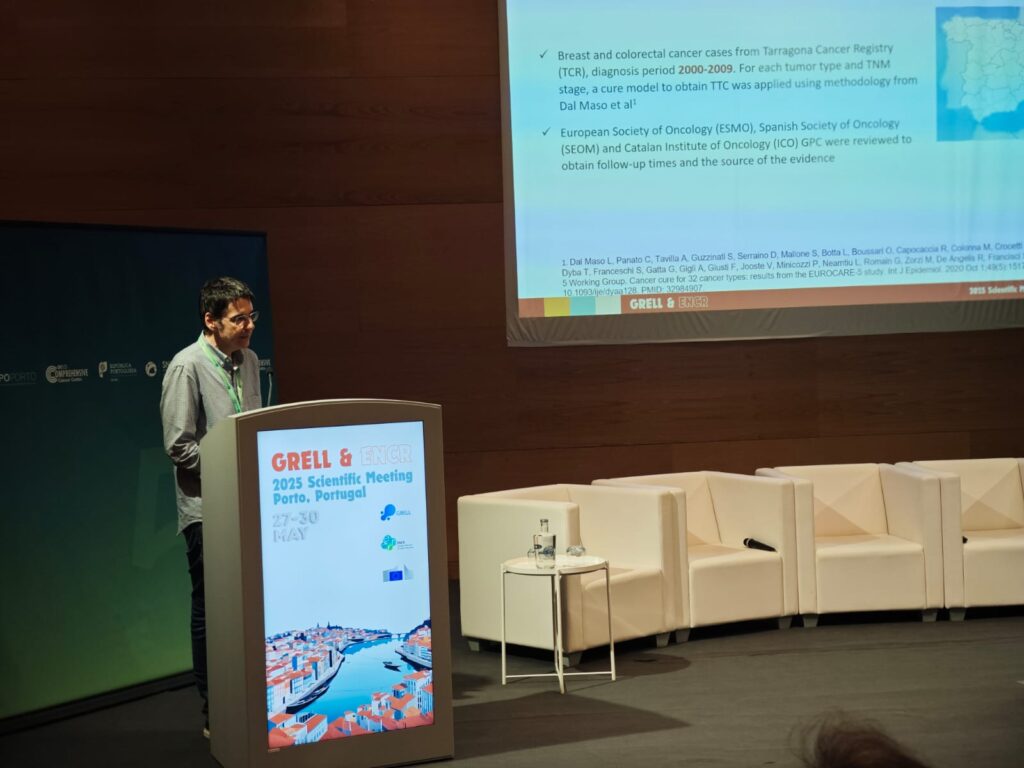
Professionals from the Oncology, Translational, Epidemiological and Clinical Research Group (GIOTEC) of the Institut d’Investigació Sanitària Pere Virgili and the Hospital Universitari Sant Joan de Reus, have participated in the 49th Congress of the Group of Cancer Epidemiology and Registration in Latin Language Countries (GRELL) and the congress Oporto (Portugal) from 27 to 30 May 2025.
The GRELL congress is the international meeting point for professionals of Latin Language Cancer Registries where results and experiences in Cancer Epidemiology are shared. This year, the GRELL congress was held jointly with the ENCR congress, in which the European Cancer Registries participated, allowing the exchange of experiences, work, knowledge and future projects by professionals from Europe and Latin America.
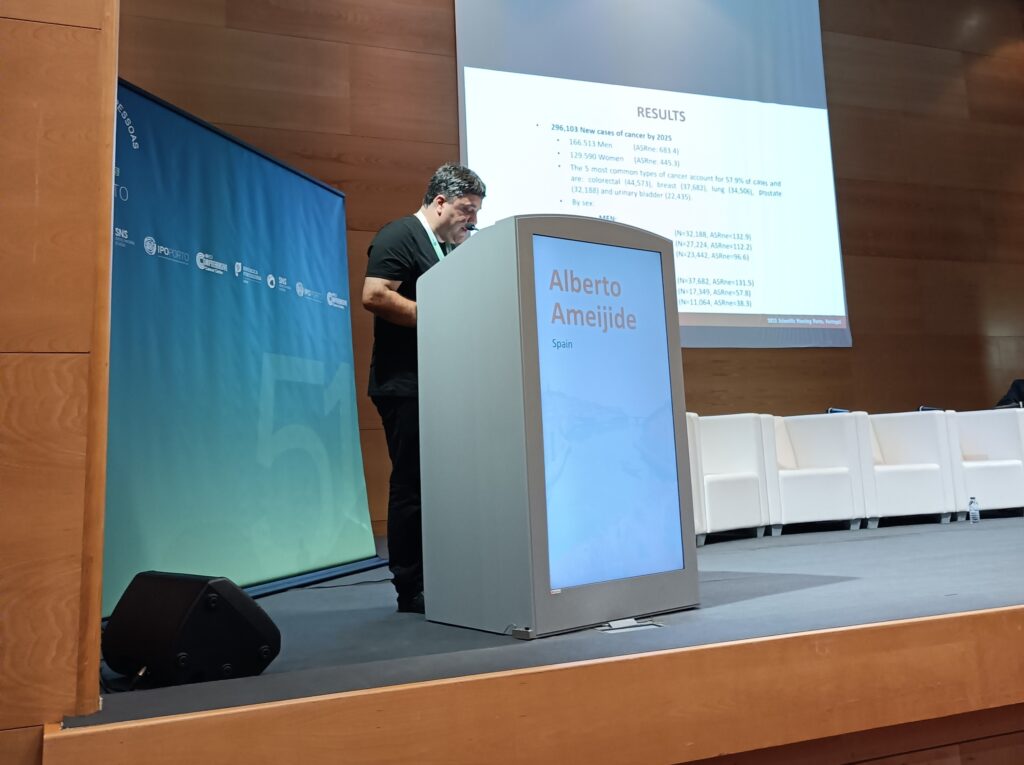
The doctors of the University Hospital Sant Joan de Reus Jaume Galceran and Marià Carulla, with the biomedical Clàudia Pla, the statistician Alberto Ameijide and the nurse Araceli Jiménez presented two oral communications, which were related to the methodology of cancer estimates in Spain, on the time to cure in how they dealt with cervical cancer, pancreatic cancer, bone cancer and triple negative breast cancer.
The event, which rewards notoriety and excellence, will hold its awards ceremony on June 12 at the Gaudí Auditorium of Tecnoparc firaReus
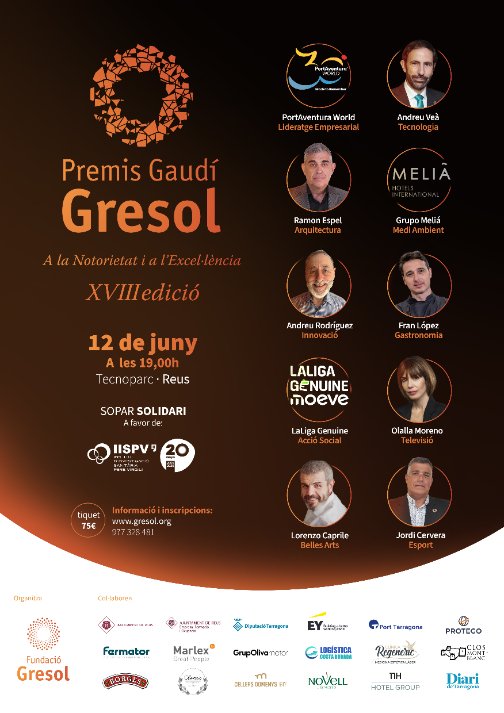
The lnstitut d’Investigació Sanitària Pere Virgili (IISPV) will be the beneficiary of the Premis Gaudí Gresol a la Notorietat i l’Excel·lència this year 2025, coinciding with 20 years of work in the field of biomedical research. The competition, which celebrates its 18th edition this year, will award the prizes on June 12 (7 p.m.) at the Gaudí auditorium of the firaReus complex.
The awards presentation ceremony, held on Wednesday, June 4 at the Ajuntament de Reus, was attended by the president of the Gresol Foundation, Emili Correig, the mayor of Reus, Sandra Guaita, the councilman of Empresa, Formació i Ocupació, Òscar Subirats and the general director of the Gresol Foundation, Robert Moragues.
The awards highlight the professional and personal careers, merits, worth and dedication of renowned entities and personalities, both in Catalonia and throughout Spain. The winners in this 18th edition are: in the category of Business Leadership, PortAventura World; in Technology, Andreu Veà; in Architecture, Ramon Espel; in Environment, Grupo Meliá; in Innovation, Andreu Rodríguez; in Gastronomy, Fran López; in Social Action, LaLiga Genuine; in Television, Olalla Moreno; in Fine Arts, Lorenzo Caprile; and, in Sports, Jordi Cervera.
Among the winners in past editions, there are personalities such as Pau Gasol, Valentí Fuster, Luis del Olmo, Ferran Adrià, Juan A. Samaranch, Isidre Fainé, Carles Sentís, Eduard Punset, Antoni Brufau, Mercè Sampietro, Joan Roca, Carme Ruscalleda, Anna Ferrer, Maribel Verdú, Elena Arzak, Josep M. Pou, Marc Márquez, Jordi Cruz, Gemma Mengual, Joan Pera, Manel Fuentes, Josep M. Mainat, M. De la Pau Janer, María Blasco, Jordi Basté, Marina Rossell, Tricicle, Susanna Griso or Juan Carlos Unzué among others.
This Saturday, May 31, is World No Tobacco Day and calls for preventive, educational and legislative measures to protect the health of children, reducing exposure to the toxic substances in smoke that persist once smoking is over.
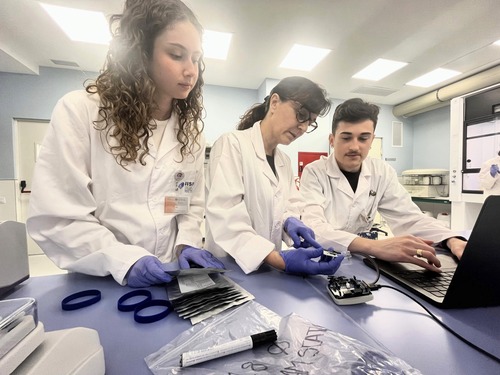
The Institut d’Investigació Sanitària Pere Virgili (IISPV) continues its research on the effects produced by the toxic substances in tobacco, especially in children. On the occasion of the celebration of World No Tobacco Day, Noelia Ramírez, researcher at the IISPV and member of the research group in Pediatrics, Nutrition and Human Development (PEDINUR) of the University Rovira i Virgili (URV) and the IISPV, presented the latest results of her studies on the consequences of residual smoke.
Ramírez stresses that it is essential to be aware of the harmful effects that exist when exposed to nicotine, especially in the case of children under 5 years of age. In this sense, he explains that the so-called third-hand smoke is especially dangerous for the youngest children and is usually underestimated by parents and public authorities. The fact is that “this route of exposure is still not sufficiently well known. The toxic substances that make up this residual smoke also remain on objects and furniture surfaces, as well as the skin, mouth, lungs and clothing”. Ramírez stresses that, on world days like this one, it is important to protect the health of the population, especially children, with preventive measures, as well as educational and legislative measures.
Although anti-smoking policies have reduced exposure to smoke in public spaces, Ramirez says, many children are still exposed at home and outdoors.
Mayor riesgo de enfermedades respiratorias El impacto de este tipo de humo se traduce, en el caso de los más vulnerables, como los niños y niñas, en alteraciones del crecimiento, en un mayor riesgo de enfermedades respiratorias, malformaciones congénitas no cromosómicas (en caso de una exposición en la gestación) y caries dentales y enfermedades como otitis recurrentes.
El humo residual persiste, reacciona con otras sustancias del ambiente y cuesta eliminarlo, puesto que las sustancias tóxicas, como se apuntaba, resisten una limpieza superficial, como la ventilación, y también quedan partículas en movimiento, dependiendo de las temperaturas o flujos de ventilación. Además, cuando interactúan con una persona ésta también puede repartir en otros rincones estas sustancias.
Algunos de los consejos preventivos para evitar la presencia prolongada del humo de tercera mano son, entre otros, limitar los espacios donde se fuma, limpiar a fondo donde se haga -teniendo en cuenta materiales como alfombras y cortinas- y llevar en el caso de los fumadores, especialmente si tienen contacto con los más pequeños, una limpieza profunda y cuidadosa de manos, boca y ropa.
The intervention will take place on June 4 at 7.30 p.m. at Pavelló dels Distingits of the Hospital Universitari Institut Pere Mata and can also be followed online.
The Filial de Reus de l’Acadèmia de Ciències Mèdiques de Catalunya i Balears organizes, for next Wednesday June 4 at 19.30 pm in the Pavelló dels Distingits of the Hospital Universitari Institut Pere Mata, a talk entitled Eating disorders and addictive behaviors, which will be given by Dr. Fernando Fernandez Aranda, head of section and director of the Unitat de Trastorns Alimentaris i Servei de Psicologia of the Hospital Universitari de Bellvitge IDIBELL, also professor at the Universitat de Barcelona, Fernando Fernández Aranda. He is also in ICREA Acadèmia and deputy director of CIBERobn.
The intervention can also be followed online (link also available in the QR code on the informative poster). The activity is supported by HU Institut Pere Mata, Universitat Rovira i Virgili, Institut d’Investigació Sanitària Pere Virgili and Hospital Universitari Sant Joaan de Reus i Baix Camp.
